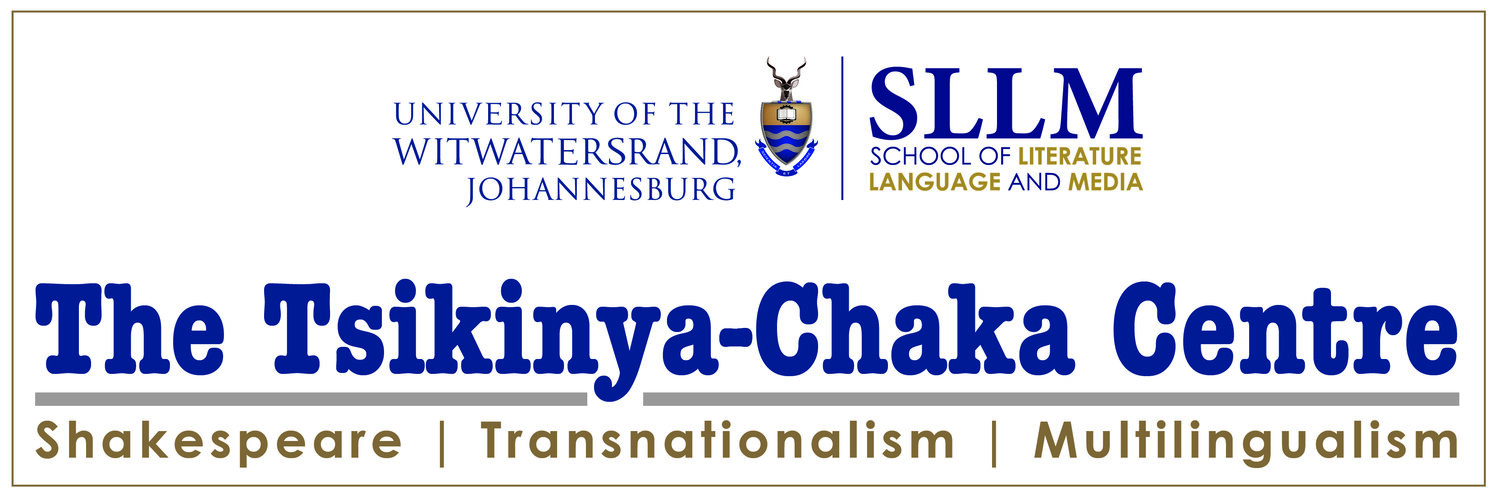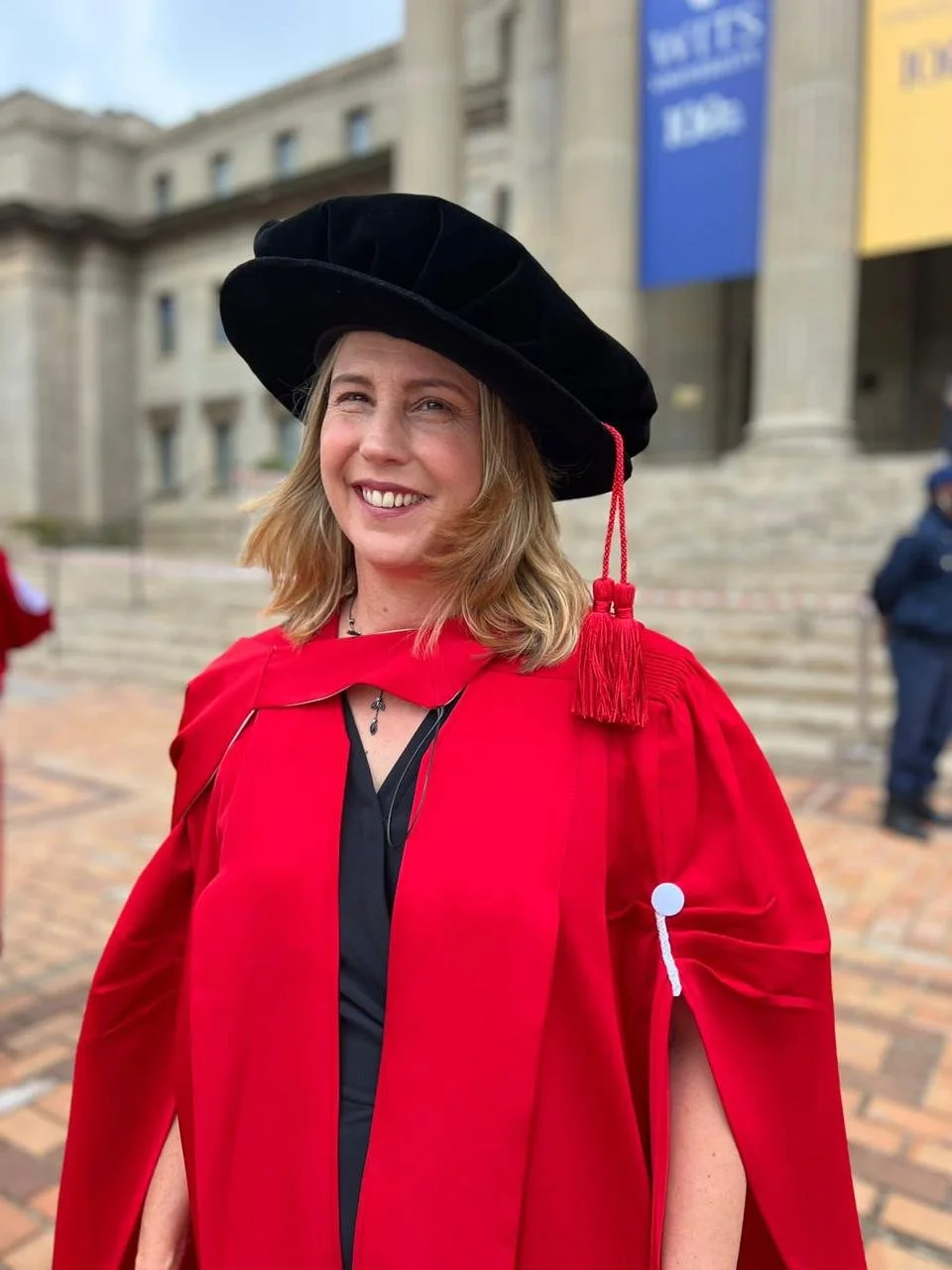Public Shakespeare / Shakespearean publics
The Tsikinya-Chaka Centre is a research entity but its work is consciously and deliberately public-facing. Some of these “publics” are constituted in educational contexts: teachers and students at schools and universities, as well as language and literacy experts (and the policy-makers they seek to advise), producers of educational materials and more. Other publics served by the TCC operate in the arts sector: theatre makers and film makers, translators, writers, actors, directors. Of course, these various publics are in turn part of a wider public sphere: audiences, viewers, readers, media consumers - citizens with thousands of different experiences of, associations with and attitudes towards Shakespeare. Here are a few recent examples of the ways in which TCC staff and affiliate members are doing what Jeffrey R. Wilson calls “Public Shakespeare”.
TCC affiliate Jean Meiring
The TCC’s newest affiliate member, Jean Meiring, is well-practised in addressing literary publics. A lawyer by training, Meiring is a writer-researcher-speaker-creator who wears multiple hats! He regularly contributes to the vital and vibrant Afrikaans literary website litnet - and it is here, too, that the text of his Johan Combrink Memorial Lecture (delivered in Stellenbosch last month) has been published.
Meiring’s talk, “Dertig jaar, watwo: drie millennia van stories”, is a tour de force that elucidates the ancient Babylonian tale of Pyramus and Thisbe - as told by Ovid, Boccaccio, Chaucer and . . . you guessed it, Shakespeare. Or, more specifically, by the woeful would-be actors in A Midsummer Night’s Dream. For Afrikaans readers and audiences, Shakespeare’s “rude mechanicals” have been brought to life by various translators. In 1974, there was Eitemal - the pen name of W.J. du Plooy Erlank - who introduced Piet Plank (Peter Quince), Tap (Snug), Bolle (Bottom), Blaas (Flute), Snoet (Snout) and Maerman (Starveling). Fast forward forty years, and retired lawyer Deryck Uys produced his own translation; Midsomernagdroom is not one of the titles published in the TCC Press series of Uys’ translations, but we at the TCC know that he would have been very pleased to have his translation discussed in such an erudite context. Likewise the late Louis Lötter, an agricultural journalist who also turned his hand to Shakespeare-in-Afrikaans late in life, and whose (as yet) unpublished translation of a Midsummer Night’s Dream is appraised by Meiring alongside those of Eitemal and Uys. For Meiring, the trajectory of the Pyramus and Thisbe narrative over three millennia - from its Babylonian roots to its Afrikaans translators - shows how stories work in “powerful and almost entirely unchanged” ways. And for those who have followed the TCC’s work in recent years, there is an intriguing connection to be drawn here to the JAM ensemble’s short film, A Midsummer Ice Cream.
TCC Schools Liaison Officer Linda Ritchie
Linda Ritchie, the TCC’s Schools Liaison Officer, completed her PhD at Wits in 2023 with a thesis titled “Translanguaging with ‘Monolingual’ Teachers and Heterogeneous Multilingual Learners: Forging New Pedagogies with Shakespeare”. In addition to publishing academic articles and essays on Shakespeare and multilingualism in education, Ritchie is disseminating the findings of her research to English teachers at high schools in and around Gauteng through a series of lectures and workshops.
Last year, she joined forces with TCC affiliates Gina Bloom (University of California, Davis) and Lauren Bates (Educasions), who are rolling out the mixed reality video game Play the Knave as a Shakespearean teaching and learning resource at schools in Cape Town and Johannesburg. This year, Ritchie, Bloom and Bates are collaborating with the Shakespeare Schools Festival SA to provide support for teachers, facilitators and directors working with young theatre makers participating in the Festival. As a multimodal teaching tool, Play the Knave complements the multilingual focus of Ritchie’s pedagogical approach.
Ritchie was invited to address the IEB (Independent Exams Board) English Home Language subject conference, held at the Birchwood Conference Centre on 10 February, to share ideas with high school teachers about reinvigorating classroom encounters with Shakespeare. Her talk was titled “Yes, you can! Making Shakespeare more relevant for South African learners”.
On 20 February, the Shakespeare Schools Festival invited TCC Director Chris Thurman to run an online workshop for a group of teachers and learners from various schools and youth theatre organisations. The focus of the session was translating Shakespeare into South African languages. A number of those who attended the workshop are planning to present bi- or multilingual productions at this year's Festival in Cape Town. Thurman gave a brief history of Shakespeare-in-translation in South Africa, and also offered examples of recent film material produced by the TCC and its partners to inspire ongoing translation practice. He also noted that various Shakespeare Schools Festival productions over the years have pioneered translation into isiXhosa, isiZulu, Afrikaans, Kaaps and other languages.
There are more Shakespeare Schools Festival workshops in store later this year, when Bloom, Bates, Thurman and Ritchie help participants prepare for the Johannesburg leg of the Festival.
Thurman and Ritchie have also been sharing the work of the TCC with different scholarly “publics” at recent conferences. Ritchie presented a paper at an online seminar hosted by the University of Lancaster’s Literacy Research Centre on 15 March. The seminar, on the subject of “Decolonisation in Higher Education”, drew on a 2023 special issue of the journal Decolonial Subversions; Ritchie joined the publication’s co-editor Victoria Odeniyi (University of the Arts) and her fellow-contributor, independent Algerian scholar Nour Souleh, to discuss the role of linguistic diversity in decolonising the university.
Ritchie’s presentation was based on her experience of adopting translanguaging pedagogical strategies while teaching a “trans-Atlantic Julius Caesar” as part of a collaboration between Wits and the University of Texas at Austin in 2022.
Thurman travelled to Paris to join the annual congress of the French Shakespeare Society (14-16 March). The conference theme was “Shakespeare in Focus: The art of small things”, and Thurman gave a paper about “Small South African Shakespeares onscreen”, reflecting on the Speak Me A Speech film project co-produced by the TCC and CineSouth Studios.
Each Speak Me A Speech performance, viewed in terms of the conference’s Call For Papers, can be seen to contain a moment – within the “moment” of the speech itself, lifted out of the play in which it occurs but carrying with it traces of the wider narrative and thematic arcs – in which minor changes to words or details in the original text have the potential to profoundly reframe the ways in which viewers/listeners engage with the Shakespearean material. In one sense, this is an inevitable function of translation, but in the Speak Me A Speech monologues these subtle shifts are culturally, historically and politically significant.







